News
1. Install the ventilation system
Install ventilation systems in the duck house, such as ventilation fans, exhaust Fan, and cooling pads. Strengthening ventilation can promote air flow, accelerate the evaporation of ducks and take away theheat, thereby reducing the body temperature of ducks. In order to reduce the occurrence and spread of diseases, the house should be maintained. Fresh air inside. When the climate changes, the ventilation volume should be adjusted in time, and the temperature in the house should be adjusted to avoid the temperature rising and falling significantly, and the duck catches a cold if the temperature difference is too large.
2. Shading and cooling
In order to reduce solar radiation, the roof of the duck canopy can be painted white, and the greening can effectively reduce the temperature in the house. Due to direct sunlight, the ducks are mostly concentrated in the house. Plants or shading nets should be used above the sports field to properly cover. Shade can increase the range of activities of the duck group and avoid the increase in individual heat production due to crowding.
3. Spray cooling
Cooling measures such as water spraying on the roof and water spraying in the house can be taken every 1 to 2 hours for about 10 to 15 minutes each time. It can be combined with the use of disinfectants to achieve disinfection and cooling.
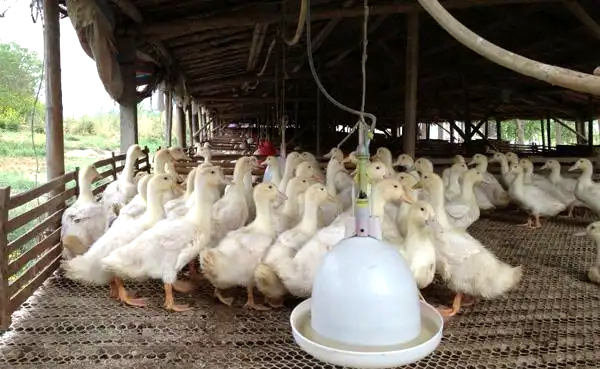 4. Change the feeding mode
4. Change the feeding mode
Laying a leaky manure net and raising it online can avoid contact between ducks and manure, reduce the chance of disease transmission, and reduce the incidence of disease. Moreover, net breeding can reduce the movement of the ducks, reduce the nutritional consumption and heat production of the ducks, and is conducive to the healthy growth of the ducks. When raising ducks on the ground, it is best not to use thick bedding material. In the later stage, cement or brick floors should be used to raise the ducks. Increasing the number of manure removals can effectively alleviate the impact of rising temperatures.
5. Appropriately reduce the stocking density
It should be avoided that the individual heat dissipation area is reduced due to the overcrowding of overcrowded duck flocks, and the heat production of the duck's increases, which increases the difficulty of heatstroke prevention and cooling work, increases the risk of heat stress and heatstroke in the duck flock and causes unnecessary economic losses.
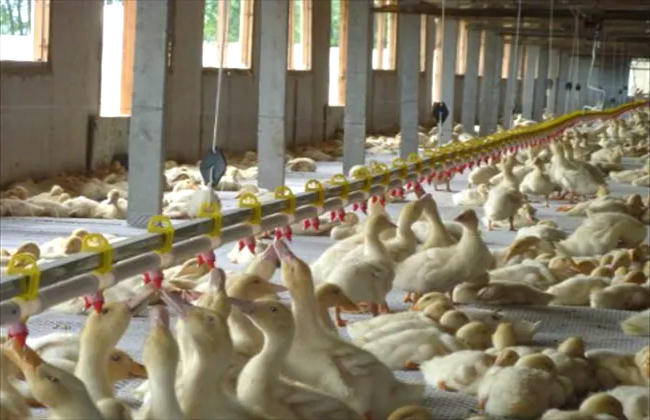
6. Properly increase the number of drinking fountains
Ducks have the habit of bathing as waterfowl, and drinking fountains should be appropriately added to avoid the influence of frequent bathing on drinking water due to hot weather and ensure that ducks have enough drinking water.
7. Supply fresh feed
In high temperature and high humidity weather and spraying water to cool down, the feed is prone to agglomeration and deterioration, affecting palatability, causing ducks to lose their appetite, and prone to poisoning in severe cases. Therefore, do not add too much feed each time, and keep the feed fresh to prevent mildew. The barrel should be emptied once a day and cannot be accumulated. At noon, green vegetables or watermelon rind can be appropriately added to relieve heat stress.
8. Adjust the feeding time
It should be fed at night or early in the morning, reduced or not fed when it is hot during the day, and the ducks should be properly driven to increase feed intake.
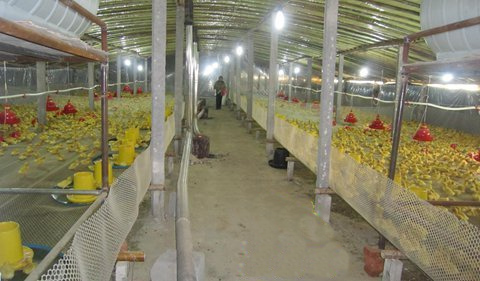
9. Add vitamins and minerals
Due to the hot weather, the excretion of sodium and potassium by ducks increases, and the frequency of wheezing increases, which can lead to a decrease in the concentration of carbon dioxide in the plasma, which may lead to respiratory alkalosis. Additional sodium and potassium should be added to the diet or drinking water. Or add carbonate to help maintain electrolyte balance. A dosing device can be installed on the automatic water supply system through which carbonate, sodium, and potassium are regularly added to the drinking water. In order to alleviate the adverse effects of heat stress on the duck body, 0.1% to 05% sodium bicarbonate and 100 to 200 mg of vitamin C can be added to the feed per kilogram.
10. Clean up feces in time
High-temperature and high-humidity feces ferment quickly, and it is easy to produce a large amount of harmful gases such as nitrogen and hydrogen sulfide. The manure should be cleaned up or the bedding should be replaced in time to keep the house clean and air quality, so as to create a good growing environment for the ducks.
11. Do a good job in disinfection
The hot weather in summer is easy to breed bacteria. Plasson drinkers and feeder buckets should be cleaned more frequently. If a nipple drinker is installed, it can effectively avoid the breeding of bacteria. Improve the disinfection system, do a good job of daily disinfection, reduce the probability of disease occurrence, and prevent the damage to ducks caused by flies and mosquitoes.
12. Strengthen epidemic prevention and control
Observation can be strengthened, countermeasures should be taken in time if abnormalities are found, and immunization and prevention work should be done well. During the high temperature at noon, the harassment of the ducks should be minimized, and they should be kept quiet to reduce their heat generation and relieve the stress caused by the heat.
13. Use anti-stress medications
When the weather is hot, Chinese herbs such as mint and fenugreek as well as vitamin C can be appropriately added to relieve the effects of heat stress and prevent heat stroke.
View More information about chicken farm.

VIEW our Youtube More breeding equipment video
Phoenix Breeding Equipment: 19+ years of breeding equipment production and export experience. As a result of our high-quality products and outstanding customer service, we have gained a global sales network reaching Europe, North America, Southeast Asia, Africa, South America, etc. Successfully in use on both family-owned farms and large farm complexes. Providing individual and automatic equipment to feed your livestock: chicken drinking line, chicken feeding line, poultry drinker and feeder, exhaust/ventilation fans, Egg Incubator, and so on breeding equipment.
CONTACT US
Phone:+86 19061974162
Email: sales@goldphoenixa.com
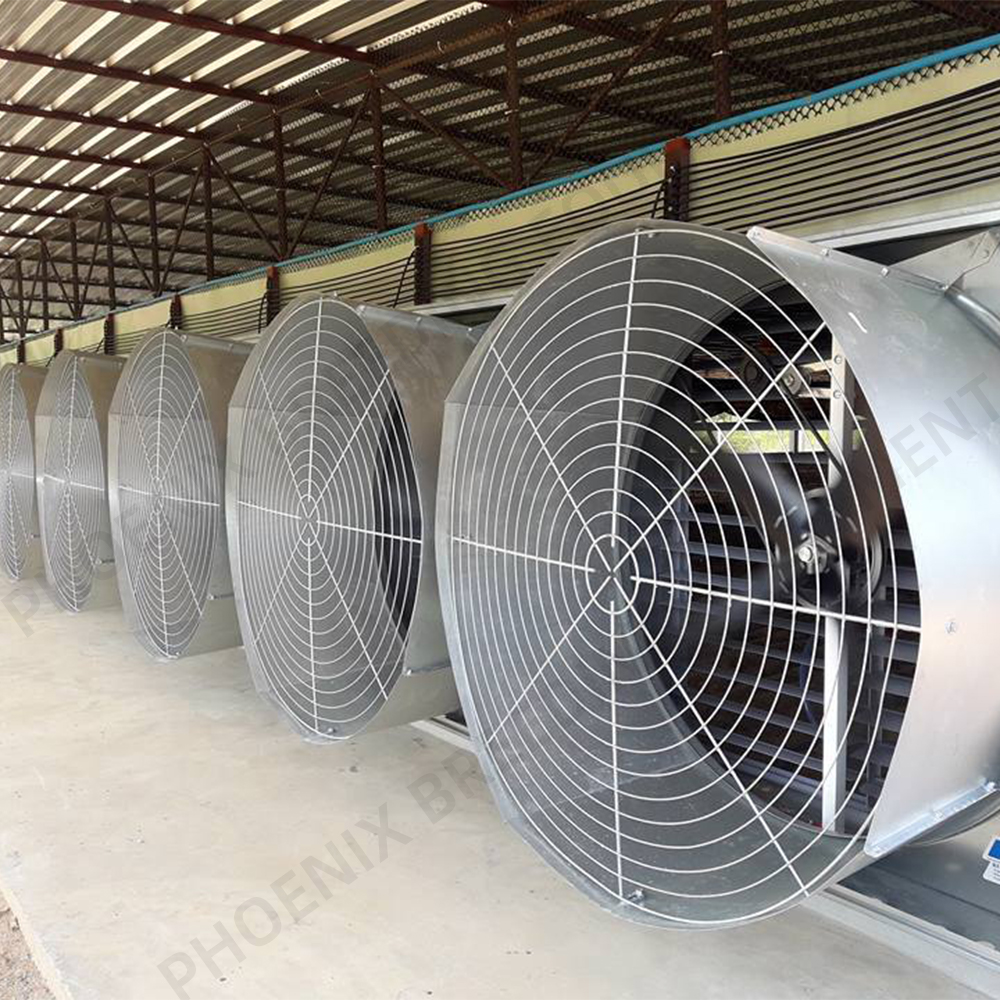
Pulished on Feb. 06, 2026
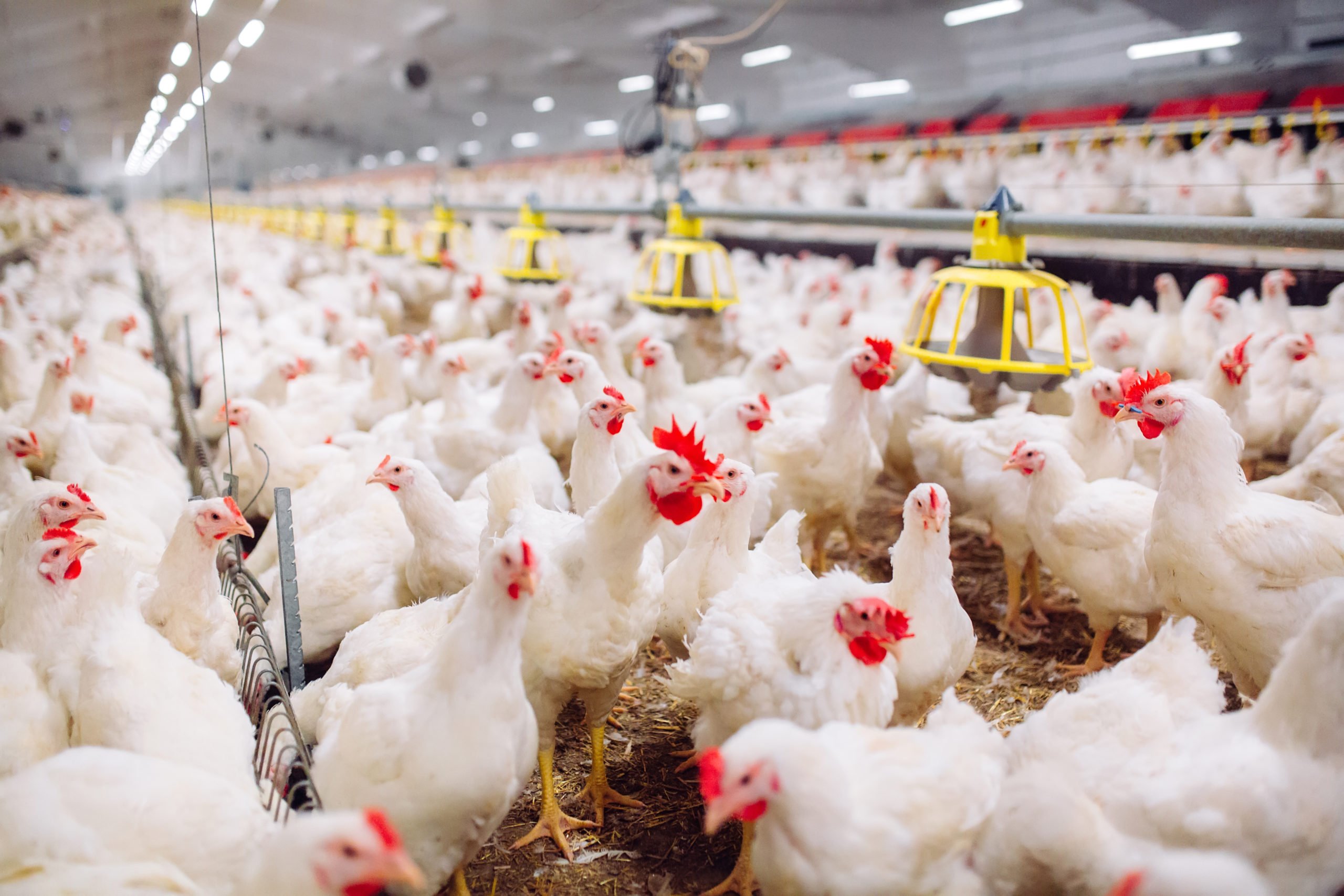
Pulished on Jan. 28, 2026